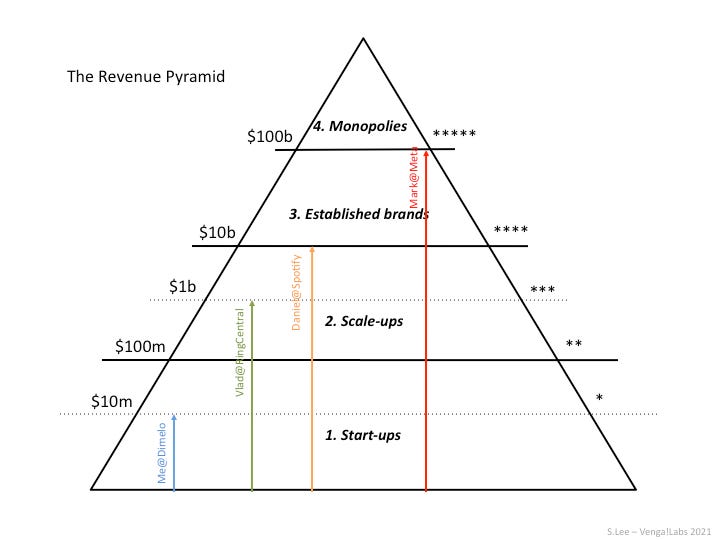It’s hard to be a start-up founder, and I am always appreciative of any founder I discuss with. Some of them create trinkets, others build cathedrals, and that’s fine!
What a challenging journey it is to build something!
For first-time entrepreneurs, raising funds seems like a major achievement. It’s true, in a sense: investors have validated your project, and they are supposed to recognize the bests in class. Well, they are betting their LPs’ money on it, and they expect excellent returns.
At this time, you may be the star of the show and still have less revenue than the bakery around the corner :-)
Few understand that they are in for a marathon and that VC money is like a banana at the pitstop.
VCs are in for a sprint, not a marathon. They give you the energy to go to the next pitstop/round.
They don’t care if your company fails after they exit or your mission is incomplete. Maybe you don’t care either because you want to spend your proceeds in a Lamborghini Urus and boast about how outstanding your leadership was.
If you are a first-time founder, achieving financial independence is an important goal!
But if you’re a genuine entrepreneur, money is a side effect, not a destination. Fulfilling your mission is what drives you.
For your type, the ultimate goal is to have the most extensive reach so that your mission impacts a maximum number of people/companies.
Let’s see what this journey looks like:
Stage 1a: Local Start-up (up to $10M revenue)
You’ve defined the pain point and built an MVP to solve it at this stage. A number of customers believe in your future in your HQ country and surroundings. However, you are still unsure if you have nailed your ICP and optimized your PMF.
Stage 1b: Regional Start-up (up to $100M revenue)
You achieve repeatable sales, your PMF looks good. You begin to expand in new territories outside of your comfort zone.
Stage 2a: Regional Scale-up (up to $1b revenue)
You begin to be visible outside of your target market. You optimize your organization to be more efficient. You are present in at least two regions (North America and Europe, for instance).
Stage 2b: Global Scale-up (up to $10b revenue)
You sell in most parts of the world. You successfully launch several product lines. Your organization looks like a cube. You face the local vs. global dilemma.
Stage 3: Established brand (up to $100b revenue)
Your brand is known globally. You may not be the global leader yet, but you’re in the top 3 worldwide. People buy your stock and sleep on it. You face complacency and the lack of innovation dilemma.
Stage 4: Monopoly (above $100b revenue)
The ultimate stretch. You’re so dominant that people have to resort to your products or services (even those who don’t like you). You have enough money to do miracles! It’s high time you give back to society!
Defining your end goal
Do you want to go to the top? Or would you be happy enough to reach the $10m step?
Are you vying for more?
It’s a question that needs a frank answer because it will influence your strategy, sometimes unconsciously.
The next question is: are you willing and able to go up there?
Knowledge: Don’t worry; you don’t have to know what Satya Nadella knows; you will learn it along the way.
Energy: Do you have the energy level to climb the mountain? Do you have life hacks to recharge frequently?
Discomfort: Are you ready to quit your comfort zone? To compromise on your opinionated views?
Management: Do you prefer to do things yourself or empower your team?
Willpower: Do you have a relentless and indestructible desire or are your doubts slowly taking over?
Choice: Which part of your life are you ready to surrender?
Most individuals have their limits and it takes different personality traits to start a company vs. develop it. For instance, the head of your sales team in a start-up will probably not make it as VP Sales in a scale-up.
What about the founder?
Each stage requires a different mindset and skillset. Of course, assembling a talented team you can delegate tasks to is crucial. Hiring the right individuals is the cornerstone of success.
Separating your roles as a founder and operator, CEO and shareholder, is also a prime consideration. At some stage, investors may question your capacities as a founding CEO. Having a clear objective will help you navigate those circumstances. The best decision may be to step down and pass the baton to a more capable CEO or sell the company.
Founders that go through different stages are absolute stars, in my opinion, and should be celebrated.
Let’s have a look at the accomplishment of a few exceptional entrepreneurs, founders that are still CEO of their company:
Three stages - Vlad Shmunis*** co-founded RingCentral in 1999, which he bootstrapped until 2006. It is now a $1.5b ARR company.
Four stages - Daniel Ek**** co-founded Spotify in 2006 and grew it to a $10b run rate company.
Five stages - Mark Zuckerberg***** founded Facebook in 2004. His company is now known as Meta and posts revenues north of $100b!
For the fun of it, let’s say you get one star when you went through 1 stage, 2 stars, when you passed 2 stages, etc.
Bottom line: with the right idea, it is possible to grow your start-up to an incredible scale if you have the “je-ne-sais-quoi” those celebrity founders have.
The first stage is probably the hardest: getting your rocket off the ground requires outstanding energy, and we must celebrate all those who try.
Big dreams
But don’t settle on being a 1-star officer.
Can you imagine how exhilarating must be the journey to stage 5? Can you imagine what those 5-star entrepreneurs learned along the way? The number and diversity of people they met, the challenges they had to face, the amount of knowledge they gathered?
If you have big dreams like this, start early!
Gorillas need a good 20 years to grow.
Are you about 30 years old? Now is your time!
Guess what? Venga!Labs can help.








